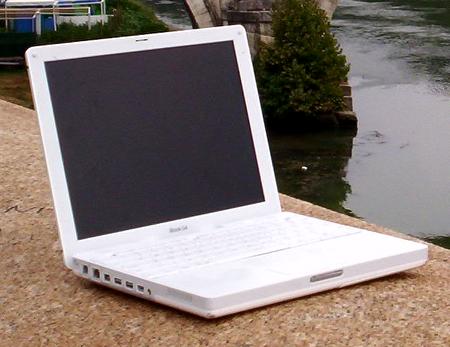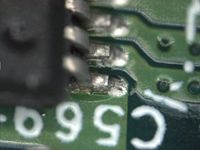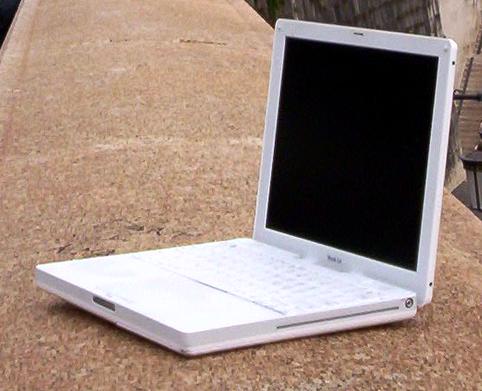Is Denmark’s Consumer Complaints Board Right About The G4 iBook?
Wednesday, May 9, 2007
by Charles W. Moore
Last week, ruling n a specific complaint case, Denmark’s Consumer Complaints Board said it now has evidence of a hidden, original design defect in Apple’s iBook G4.
That a serious problem existed with the G3 dual USB iBook is indisputable and was acknowledged by Apple with an extended repair program (now expired) through which iBook users within a specified serial number range could get their computers’ logic boards replaced if the defect materialized.
It was widely believed, or at least hoped, that the problem had been licked with the introduction of the G4 iBook in late 2003. From time to time the odd complaint about a G4 iBook logic board failure has come to my attention, but a certain incidence of such failures can be anticipated with any computer model.

However, the Danish bureaucrats claim that a substantial percentage of of iBook G4 users experience the power going off in the computer and the display screen going blank after just over one year’s use, but that when they contact Apple to have the issue repaired or to return the computer, Apple rejects the complaint on the grounds that there is no question of a design fault, and that the 12 months’ warranty has expired (although users who purchased AppleCare would be covered for three years).
The Consumer Complaints Board reported in a press release that it now has documentation showing that there really is a design fault, and therefore decided last month that Danish consumers must be able to return computers with this fault to Apple.�The Board sent one of the allegedly faulty iBooks to Delta, an independent electronics laboratory, to have it examined.
�


The investigation methodology included taking the iBook G4 apart and removing the logic board, which was analyzed and examined by means of visual inspection, stereo microscopy, scanning acoustic microscopy and X-ray microscopy of suspected components.� Individual components under suspicion were cut out of the logic board and embedded in epoxy for subsequent micro-sectioning.� A few solder joints were further examined after micro-sectioning, in which the inner structure of these soldering positions becomes visible by microscopy.

The press release reports that Apple has settled a number of cases in Denmark on the basis of the investigation report.
The investigation and pictures of the inside of the computer showing the faulty components can be seen here:
http://www.forbrug.dk/presse/nyheder/pressekit/ibookg4/pressefoto/
and here:
http://www.forbrug.dk/presse/nyheder/pressekit/ibookg4/statement-of-claim-40317-1637-english/
This story has of course been widely reported on the Mac Web, and it is naturally causing some anxiety to owners of G4 iBooks and making persons who had been considering the purchase of one of these machines second-guess. Reader Tom Gabriel writes:
Hey Charles,
Did you see the new problem with iBooks, this time with the G4?
First the G3s, now these - I was thinking of getting an iBook G4, and am now reconsidering.
What do you think?
Well, Tom, don’t hold it against me if you do buy a G4 iBook and have trouble, but here’s what I think.
I’m skeptical that there is a pandemic problem afflicting the G4 iBook. I don’t doubt for a moment that the Danish researchers discovered a defect issue in the one iBook they tore down, and that there would be others, but the Consumer Complaints Board’s report makes it sound like the problem is universal, and there is considerable evidence indicating that’s not the case. My daughter has a 1.2 GHz G4 iBook that she has used hard with little maintenance since she purchased it in October, 2004. She carried it in a backpack through Europe in the summer of 2005, used it as her workhorse during her two last years of university, and now has it with her in Japan, where she is living and working. No logic board issues thus far.

Several of my friends also own G4 iBooks, and have reported no problems with them either.
Of course, a handful of anecdotal cases can’t be regarded as conclusive. The white G3 iBook was statistically the least reliable Apple laptop of the 1999 - 2005 era, and by a wide margin, with the absolute nadir being the 2002-2003 models, one of which I happen to own, and which has given essentially flawless service now for more than four years.
However, in the MacInTouch iBook and PowerBook Reliability survey, which is not scientific since respondents are self-selected, but with more than 10,000 readers reporting on 41 models is more than broad enough to give a fairly reelable statistical indication of relative reliability, and much broader than the Danish research sample, the G4 iBook scores from middle-of-the-road to better than average - doing roughly as well as the PowerBook G3 Series which is widely lauded for reliability, and substantially better than the PowerBook G4 Titanium models. If there was an extraordinary defect issue with the G4 iBook, it’s difficult to fathom why it did not show up in that survey, which conversely showed that these computers were significantly better than average in repair incidence in their second and third year of service.

In terms of logic board defects, the area of focus in the Danish report, MacInTouch survey respondents who reported on the eight respective iBook G4 models referenced (four 12” variants and four 14’ variants) logged repairs in this category at rates of 10%, 6%, 3%, 2%, 12%, 7%, 6%, and 4% respectively, which is as good or better than any other Apple laptop during the period of the survey’s scope save for the ultra-reliable original G3 Clamshell iBooks. Aside from the white G3 iBooks, which required logic board replacements at rates of 30-55%. No other model showed particular problems in that category; most ranging from 6-12% needing replacement.
MacIntouch comments: “17” and 15” Aluminum PowerBooks, PowerBook G3, and iBook G4 12” models all appear to have become more reliable as new versions were introduced. This may indicate that Apple engineers were able to learn from early problems and fix them.
I expect that the last chapter in this saga has yet to be written, but in the meantime I would remain more or less neutral-weighted on the advisability of buying a used or refurbished G4 iBook. I still think that the last-revision 1.33 GHz and 1.42 GHz models especially represented an extraordinary value, with all the PowerBook-style features that Apple loaded on to sustain sales in that last interval between August, 2005 and the MacBook unveiling a year ago.

As for folks who own G4 iBooks, if your ‘Book is working fine and there is no sign of any logic board issues (which usually manifest as flaky video and/or unexpected shutdowns), I wouldn’t worry unduly. If you haven’t popped for AppleCare extended warranty coverage and you;re still in the eligibility window, that’s something you might want to consider, and as should always be attended to with any personal computer whose hard drive contains data you wouldn’t want to lose, make sure you keep your file backups (you do have backups, don’t you?) current and up to date. And I’m not advising my daughter to get rid of her G4 iBook.
Note: Letters to PowerBook Mystique Mailbag may or may not be published at the editor's discretion. Correspondents' email addresses will NOT be published unless the correspondent specifically requests publication. Letters may be edited for length and/or context.
Opinions expressed in postings to PowerBook Mystique MailBag are owned by the respective correspondents and not necessarily shared or endorsed by the Editor and/or PowerBook Central management.
If you would prefer that your message not appear in PowerBook Mystique Mailbag, we would still like to hear from you. Just clearly mark your message "NOT FOR PUBLICATION," and it will not be published.
CM